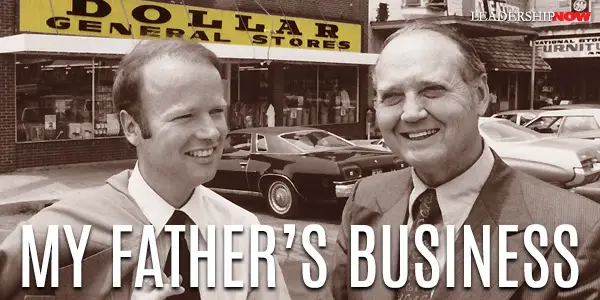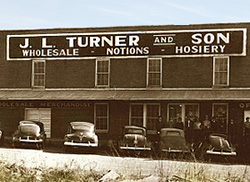 |
 |
06.12.18

My Father’s Business
T In My Father’s Business: The Small-Town Values That Built Dollar General into a Billion-Dollar Company, Cal Turner, Jr. shares the ups and downs of running a family business for just over 37 years, and along with it some good down-to-earth common sense. Cal Jr, learned from his grandfather the value of listening. Because of a freak wrestling accident, his grandfather lost his Dad at age 11 and had to leave school to run the family farm. Finishing school with only a third-grade education might hold some people back, but not Luther Turner. He saw it as a plus. “He was convinced that everyone he met was smarter than he, and that he needed to learn something from each of them. He became a first-rate observer, a great listener, and a dedicated student to life. What he practiced was more than empathy. It involved valuing the other person and his or her information, insight, and perspective.”  His mother had a huge influence on him. She valued principles. She believed that “if you have a commitment to moral integrity, you don’t need a bunch of picky rules. They aren’t necessary; in fact, they become just so much baggage.” She also taught him to separate the problem from the person. She told him, “Son, for a good boy, you get into a lot of trouble.” Cal Jr. learned to focus on the solution and the lesson. When you separate the problem from the person, everybody can come together to learn from the solution. If we focus on labels and affixing blame, we are not going to be good at solving problems. His Dad also provided much-needed support. He would compliment him in front of others. Cal Jr. finds that “so much of success and failure lies in what we take away from our primary relationships.” A family grounded in love can survive almost anything. A solid value-based upbringing makes it easier to focus on others. “Leadership exists when an organization overcomes having a boss or a boss mentality. A boss only gets results; a leader gets development.… A true leader vests the authority in the organization.” The company was built with no strategic plan. When Cal Jr. introduced it he thought he might get resistance from Cal Sr. But Cal Sr. knew it was time to make changes, but responded with, “I hope you won’t create plan planners but will have plan doers.” Thinking strategically allowed them to reexamine the way they had always done things and take a good look and individual strengths and weaknesses. A better leader emerges when a person owns his or her own weakness and reaches out to make a connection with other people to help fill in the gaps. He has said that the doors of the executive suite tend to keep everybody out, but strategic planning opens the doors to bring everybody in. Running the business becomes a company-wide proposition. On teamwork, Cal Jr. says, “Collaboration, then, is the process of raising individual selfishness to group cooperation and accomplishment, which can spur the group—or the organization, the nation, or the planet—to greater success.” What they created was a values-based dynamic in the organization. “The least control for the most development of our niche.” Those values included: “We believe that productivity is attained by emphasizing strengths in a positive environment, not by dwelling on weaknesses in an environment of guilt and blame.” A secret to their success he refers to as “selective unscrewing.” “Our past has always been screwed up, and every year, we just selectively unscrew a bit.” Continual improvement. The concept of “unscrewing” has to do with change, and change is something most of us resist. It may be simple fear of the unknown, for we cling to the security of a predictable structure or pattern, although it’s worth remembering that people also get bored with the predictable. A forgotten value his Dad believed in, is the idea that “your dress reflects the respect you are showing the other person.” The title of the book—My Father’s Business—is a bit of a double entendre. While Cal Jr. spent a lifetime tending to his Dad’s business, he also believed it was his calling. At one time he wanted to go into the ministry. A preacher convinced him otherwise. He told him not to do it. “Find anything else you can do and do that, because only if there’s nothing else you can do are you truly called to be a preacher of the gospel of Jesus Christ. There are far too many preachers who were never called in the first place.” But then it came to him from a few lessons learned working with customers what God wanted him to do. “I could have much more effect on the lives of our customers day in and day out in our stores than I ever could as a preacher conducting three services a week.” He discovered His Father’s business in his life—a principle that guided him throughout the rest of his life. 
Posted by Michael McKinney at 11:35 PM
|
BUILD YOUR KNOWLEDGE
 

How to Do Your Start-Up Right STRAIGHT TALK FOR START-UPS 
Grow Your Leadership Skills NEW AND UPCOMING LEADERSHIP BOOKS 
Leadership Minute BITE-SIZE CONCEPTS YOU CAN CHEW ON 
Classic Leadership Books BOOKS TO READ BEFORE YOU LEAD |